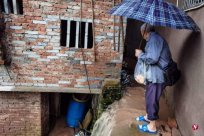(Beijing Comprehensive News) China has strongly opposed the planning of the Fukushima nuclear treatment of the Water Election of the Fukushima in Japan, announced that it will strengthen the review of Japanese imported food and continue to ban food in 10 cities including Fukushima.
In response to the United Nations International Atomic Energy Agency (IAEA) approved the Fukushima nuclear processing of the Water Election of the Fukushima, the person in charge of the Food Safety Administration of the China Customs General Administration said on Friday (July 7)Opinions of the experts participating in the evaluation work, there are still many problems in the Japanese side's legitimacy, the reliability of purifying the device, and the completeness of the monitoring plan.
According to a statement on the website of the General Administration of Customs, the person in charge said that in order to prevent Japanese food in China with radioactive pollution and protect Chinese consumers import food safety, Chinese Customs will prohibit the import of ten counties such as Fukushima, Japan (Foods, foods from other parts of Japan, especially aquatic products, including aquatic animals, strictly review the attached certification documents, strengthen supervision, implement 100%inspection, and strictly prevent risk product input.
The person in charge also said that Japan's nuclear pollution water is also concerned about Chinese consumers' concerns about Japanese food safety. Chinese customs will maintain a high degree of vigilance. The principle of absolute responsibility for domestic consumers will be taken in time.All necessary measures to ensure the safety of Chinese consumers' tables.
After the nuclear leakage of the Fukushima First Nuclear Power Station in Japan in 2011, China began to prohibit from Fukushima Prefecture, Gunma Prefecture, Tochigi Prefecture, Ido Prefecture, Izuki Prefecture, Miyagi Prefecture, Niigata County, Nagano Prefecture, and Saitama Prefecture., Tokyo Metropolitan, Chiba Prefecture, including 10 capitals, imported food, edible agricultural products and feed.
Although the IAEA report states that the Fukushima nuclear sewage disposal "meets the IAEA safety standard", the Japanese side also insisted that the Election plan is safe, but the dispute still exists, and China has always held a strong opposition.Reuters reported on Friday that Grossi, General Director of IAEA, said that international experts involved in the review have disagreement on the report.
Wang Wenbin, a spokesman for the Chinese Ministry of Foreign Affairs, pointed out on Friday that the report was rushed to be promulgated, and the conclusions were limited and one -sided.He also urged Japan to stop whitewashing and confused, responding to international concerns, and stopping the programs of the sea.



